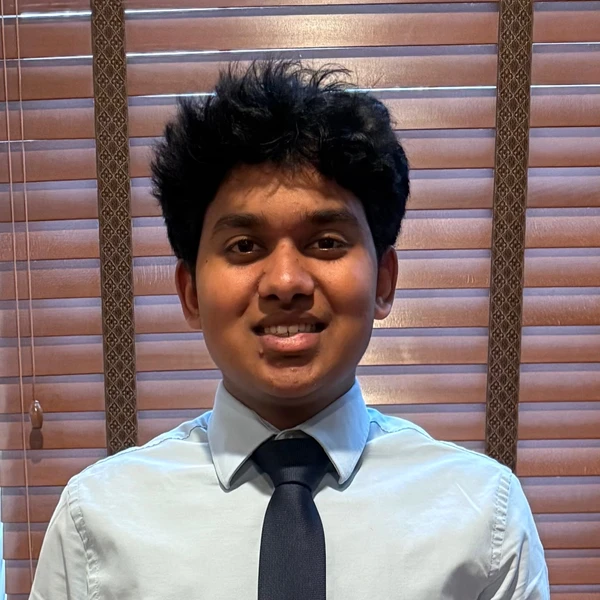
Hobbies and interests
Research
Medicine
Aarav Nambiar
675
Bold Points1x
Finalist
Aarav Nambiar
675
Bold Points1x
FinalistBio
I am attending a 7-year BS/MD at the University of Illinois-Chicago on my path to becoming a physician that continues to serve my community in Illinois.
Education
University of Illinois at Chicago
Bachelor's degree programMajors:
- Neurobiology and Neurosciences
Minors:
- Public Health
Barrington High School
High SchoolMiscellaneous
Desired degree level:
Doctoral degree program (PhD, MD, JD, etc.)
Graduate schools of interest:
Transfer schools of interest:
Majors of interest:
- Biological and Biomedical Sciences, Other
Career
Dream career field:
Medicine
Dream career goals:
Sports
Tennis
Varsity2021 – Present5 years
Awards
- 3rd Place @ State Championship
- Captain of High School Varsity Tennis team
- 2x Conference Champion
- 2x State Qualifier
Research
Biological and Biomedical Sciences, Other
Northwestern University — Research Assistant2022 – 2025
Public services
Volunteering
Buddy Up Tennis — Lead Volunteer - onboard new coaches, assist students, foster a fun learning environment2021 – PresentVolunteering
St. Alexius Medical Center — Hospital Volunteer2023 – PresentAdvocacy
Share Overseas — Vice President - Spearheaded $75K fundraiser for Pakistan Flood Relief in 20222021 – Present
Future Interests
Advocacy
Volunteering
Philanthropy
Pain & Spine Institute - Excellence in Action Scholarship
Growing up in an Indian family, I was surrounded by stories that painted Pakistan as an adversary—an idea rooted in decades of historical conflict. My parents avoided Pakistani-owned businesses, cheered against their cricket team, and discouraged friendships with Pakistani peers.
As a kid, this confused me. When I asked why, the dismissive explanation, “We just don’t like them,” only fueled my curiosity.
Refusing to accept this bias, I chose to challenge it.
As Vice President of the Share Overseas Club, I found an opportunity to do more than just disagree with my community’s prejudices. In 2022, when catastrophic floods submerged one-third of Pakistan and displaced millions, I organized a fundraising campaign to deliver crucial aid. It wasn’t easy. My parents protested the idea of helping India’s “enemy.” Friends told me I was stepping into dangerous political territory. But I kept going. I partnered with my mosque, reached out to South Asian student groups across the country, and launched social media campaigns. In just a few weeks, we raised over $75,000 for flood relief.
At first, I thought that money would be the most important outcome. But the real impact came quietly. My parents, skeptical at first, began asking questions about the people affected—children who had lost their homes, families without clean drinking water. One night, my dad forwarded me a link to a Pakistani aid organization. No words. Just the link.
That was the moment I realized: ethics isn't just about grand declarations. It's about making the hard choice when no one’s watching. It’s about putting people before politics, and principles before pride. Organizing that fundraiser meant more than raising money—it meant choosing compassion in the face of inherited prejudice. And that choice slowly opened minds.
While my family's perspective has shifted, I know these deeply rooted biases continue to divide millions of others. But I also know change is possible—when someone is willing to go first.
This fall, I’ll begin the Direct Medical Program at the University of Illinois Chicago, with a guaranteed seat at UIC’s College of Medicine. As I take my first steps toward becoming a physician, I carry this experience with me. It’s taught me that being ethical doesn’t just mean following rules—it means challenging them when they’re built on injustice. It means advocating for the patient no one wants to treat, listening to the story no one wants to hear, and offering care even when the world says to look away.
At the time, I was just a teenager trying to help people I’d never met. But now, I see that moment for what it really was: my first act of ethical leadership. It shaped not only who I am, but the kind of physician I’m striving to become—one who doesn’t just treat illness, but who helps heal division.